《英语教学法》名词解释
英语教学法教程何广铿名词解释
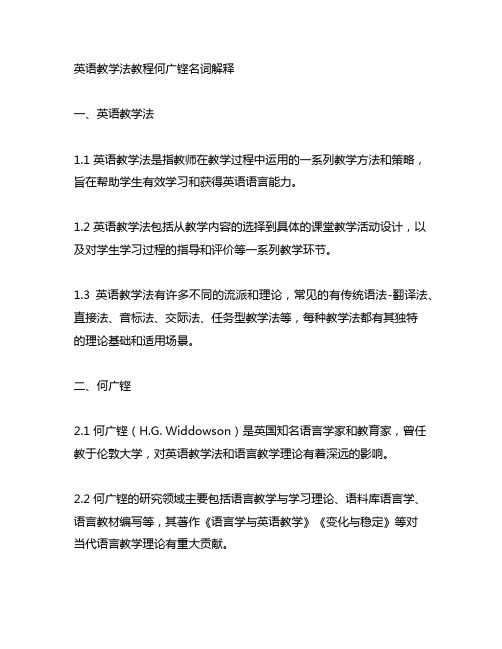
英语教学法教程何广铿名词解释一、英语教学法1.1 英语教学法是指教师在教学过程中运用的一系列教学方法和策略,旨在帮助学生有效学习和获得英语语言能力。
1.2 英语教学法包括从教学内容的选择到具体的课堂教学活动设计,以及对学生学习过程的指导和评价等一系列教学环节。
1.3 英语教学法有许多不同的流派和理论,常见的有传统语法-翻译法、直接法、音标法、交际法、任务型教学法等,每种教学法都有其独特的理论基础和适用场景。
二、何广铿2.1 何广铿(H.G. Widdowson)是英国知名语言学家和教育家,曾任教于伦敦大学,对英语教学法和语言教学理论有着深远的影响。
2.2 何广铿的研究领域主要包括语言教学与学习理论、语料库语言学、语言教材编写等,其著作《语言学与英语教学》《变化与稳定》等对当代语言教学理论有重大贡献。
2.3 何广铿提出的“交际教学法”理论受到广泛关注和认可,强调语言教学应以交际实践为核心,注重学生的语言运用能力和交际能力。
三、何广铿对英语教学法的贡献3.1 何广铿强调了交际教学法的重要性,促进了英语教学法的进步和发展。
3.2 何广铿提倡以语言为交际实践的视角来看待语言教学,强调语言教学应注重学生的语言运用能力和交际能力的培养。
3.3 何广铿的理论为英语教学法的变革提供了理论支持和实践指导,对于推动语言教学的创新和发展起到了重要作用。
四、结语4.1 何广铿的学术贡献为英语教学法的发展做出了重要贡献,其提出的交际教学法理论影响深远,对于推动英语教学法的创新和发展意义重大。
4.2 在今后的语言教学实践中,我们应当根据何广铿的理论,结合具体的教学情境,灵活运用各种英语教学法,创造良好的教学氛围,激发学生学习兴趣,促进学生语言能力的全面发展。
五、交际教学法的实5.1 何广铿提出的交际教学法理论强调语言教学应注重学生的交际能力,因此在实际的英语教学中,教师需要通过一系列的教学活动来促进学生的交际能力的培养。
5.2 在课堂教学中,教师可以组织各种形式的对话活动,让学生在真实的交际情境中进行语言交流,这不仅可以帮助学生培养实际运用语言的能力,还能激发学生对英语学习的兴趣,提高学习效果。
英语教学法课程简介

英语教学法课程简介
课程编号:050246
课程名称:英语教学法
课程名称(英文):English-Teaching Methodology
适用专业:英语
先修课程:语音、语法、听力、口语、写作
学时:72
学分:4
教学层次:本科
课程简介: 《英语教学法》是研究英语教学规律的一门科学。
“教学法”的含意是指一种理论“法则或“体系”,而不是狭义的单纯指具体的教学方式和方法。
英语教学法研究英语教学的全过程及其规律。
教学内容主要包括:1、教学理论;2、基本教学理论的教学方法和技巧;3、英语课外活动、教学手段和测试手段。
在教学中采取现代教育技术,利用学校现有的多媒体教室和多媒体语音室进行教学,理论与实践相结合,组织学生到中、小学见习、实习,培养学生的教学基本功,使学生既有教学法理论知识,又有一定的教学实践能力。
教材:王蔷:《英语教学法教程》,高等教育出版社
参考书目:1. 肖惜《英语教师职业技能训练简明教程》,高等教育出版
2.English Language Teaching Methodology,外语教学与研究出版社。
3.Aspects of Language Teaching,上海外语教育出版社
考核方式:考查
成绩评定:本学科的考试目的主要考察学生的知识掌握(对课内教材和教师的授课内容的掌握)和教学实际操作技能(教案编写、课文试讲、简笔画技能、书写技能、英语歌曲、课件制作等)。
英语教学方法范文
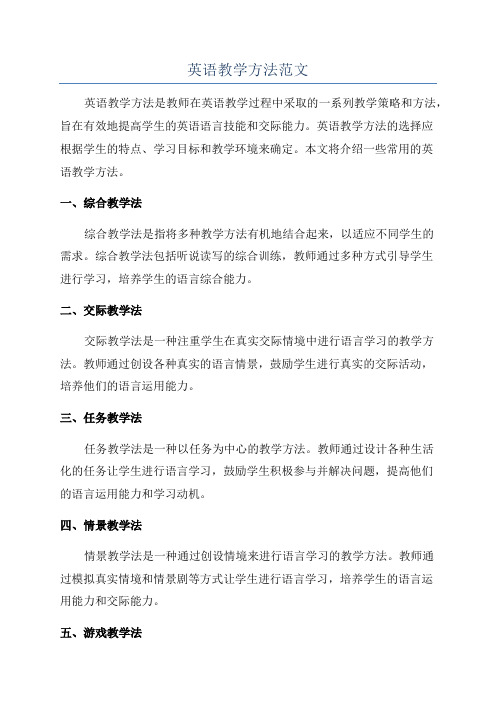
英语教学方法范文英语教学方法是教师在英语教学过程中采取的一系列教学策略和方法,旨在有效地提高学生的英语语言技能和交际能力。
英语教学方法的选择应根据学生的特点、学习目标和教学环境来确定。
本文将介绍一些常用的英语教学方法。
一、综合教学法综合教学法是指将多种教学方法有机地结合起来,以适应不同学生的需求。
综合教学法包括听说读写的综合训练,教师通过多种方式引导学生进行学习,培养学生的语言综合能力。
二、交际教学法交际教学法是一种注重学生在真实交际情境中进行语言学习的教学方法。
教师通过创设各种真实的语言情景,鼓励学生进行真实的交际活动,培养他们的语言运用能力。
三、任务教学法任务教学法是一种以任务为中心的教学方法。
教师通过设计各种生活化的任务让学生进行语言学习,鼓励学生积极参与并解决问题,提高他们的语言运用能力和学习动机。
四、情景教学法情景教学法是一种通过创设情境来进行语言学习的教学方法。
教师通过模拟真实情境和情景剧等方式让学生进行语言学习,培养学生的语言运用能力和交际能力。
五、游戏教学法游戏教学法是一种通过游戏方式进行语言学习的教学方法。
教师可以设计各种有趣的游戏,让学生在游戏中进行语言交流和学习,增加学习的趣味性和积极性。
六、多媒体教学法多媒体教学法是一种利用多媒体技术进行语言教学的方法。
教师通过使用多媒体软件、音视频等教学资源,使语言学习更加直观、形象,提高学生的学习兴趣和效果。
七、个别化教学法个别化教学法是一种根据学生的特点和需求进行个别化教学的方法。
教师通过了解学生的学习情况和需求,为每个学生制定个别的学习计划和教学方案,提高教学的针对性和效果。
八、合作教学法合作教学法是一种通过学生之间的合作来进行语言学习的方法。
教师可以组织学生进行小组活动、角色扮演等形式的合作学习,培养学生的团队合作精神和语言交际能力。
九、自主学习法自主学习法是一种注重学生自主学习和探究的教学方法。
教师在课堂上起到指导和引导的作用,让学生根据自己的学习节奏和风格进行学习,培养学生的学习能力和自我管理能力。
《英语教学法》胡春洞
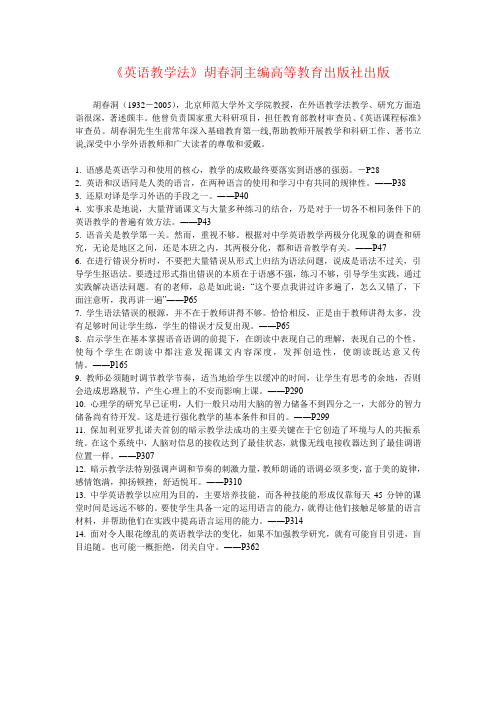
《英语教学法》胡春洞主编高等教育出版社出版胡春洞(1932-2005),北京师范大学外文学院教授,在外语教学法教学、研究方面造诣很深,著述颇丰。
他曾负责国家重大科研项目,担任教育部教材审查员、《英语课程标准》审查员。
胡春洞先生生前常年深入基础教育第一线,帮助教师开展教学和科研工作、著书立说,深受中小学外语教师和广大读者的尊敬和爱戴。
1. 语感是英语学习和使用的核心,教学的成败最终要落实到语感的强弱。
-P282. 英语和汉语同是人类的语言,在两种语言的使用和学习中有共同的规律性。
――P383. 还原对译是学习外语的手段之一。
――P404. 实事求是地说,大量背诵课文与大量多种练习的结合,乃是对于一切各不相同条件下的英语教学的普遍有效方法。
――P435. 语音关是教学第一关。
然而,重视不够。
根据对中学英语教学两极分化现象的调查和研究,无论是地区之间,还是本班之内,其两极分化,都和语音教学有关。
――P476. 在进行错误分析时,不要把大量错误从形式上归结为语法问题,说成是语法不过关,引导学生抠语法。
要透过形式指出错误的本质在于语感不强,练习不够,引导学生实践,通过实践解决语法问题。
有的老师,总是如此说:“这个要点我讲过许多遍了,怎么又错了,下面注意听,我再讲一遍”――P657. 学生语法错误的根源,并不在于教师讲得不够。
恰恰相反,正是由于教师讲得太多,没有足够时间让学生练,学生的错误才反复出现。
――P658. 启示学生在基本掌握语音语调的前提下,在朗读中表现自己的理解,表现自己的个性,使每个学生在朗读中都注意发掘课文内容深度,发挥创造性,使朗读既达意又传情。
――P1659. 教师必须随时调节教学节奏,适当地给学生以缓冲的时间,让学生有思考的余地,否则会造成思路脱节,产生心理上的不安而影响上课。
――P29010. 心理学的研究早已证明,人们一般只动用大脑的智力储备不到四分之一,大部分的智力储备尚有待开发。
第五讲《英语教学法》胡春洞

在英语教学过程种,教师应当合理利用和积极开
发课程资源,给学生提供贴近实际、贴近生活的 内容健康和丰富的课程资源。除了可以在课堂教 学中人为设计教学情景,教师还可以利用英文名 著的等课外资料来设置情景。语言的精华在文学, 而文学与人的本性密切联系。通过教学,学生已 经具备一定的语言能力和阅读基础之后,教师应 当有意识地引导学生摆脱人造语言式的填空和阅 读习题练习,进入文学名著的阅读过程中。
thanks
胡春洞认为,英语学习可以概括为两点:第
一,学习英语必须学习语法,因为语法体现 了语言的规律,而语言规律的学习又凸显了 学习过程中学生智力参与的重要性。第二, 英语的学习必须学习文学,文学体现了人的 情感和人性的美。英语教学必须依赖于两个 翅膀的提升,才能真正飞起来:一是智慧的 力量,二是语言的美感力量。
二、智力因素在英语教学过程
中具有重要作用,这种观点对 在小学开设英语课程来讲,有 什么启发意义?
现代社会是一个高度开放的社会,一个国家 和民族不能在闭关自守中获得发展。应当从小培 养孩子的面对世界的开放心态和跨文化意识,在 这种情况下,小学开英语是大势所趋。对于在小 学开设英语课程,他曾经专门撰写过一篇文章来 讨论,这篇文章名为《小学英语教学要科学化》 (载于《光明日报》,2001年02月22日)。
学英语要提高效率,就要调动和发展学生的
(完整版)英语教学法知识点整理
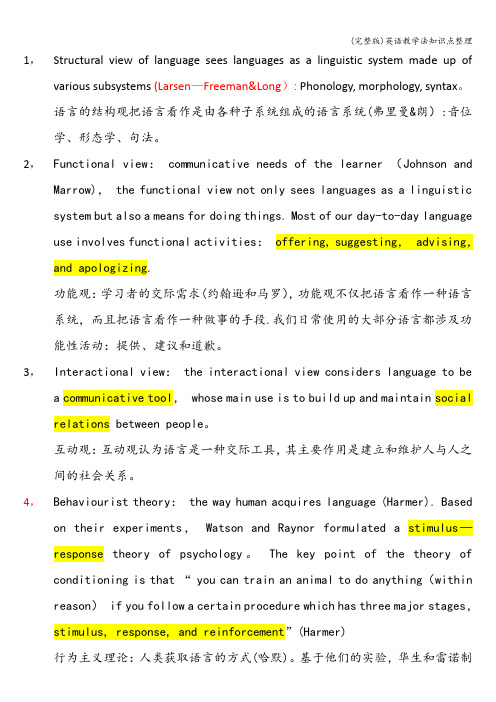
1,Structural view of language sees languages as a linguistic system made up of various subsystems (Larsen—Freeman&Long): Phonology, morphology, syntax。
语言的结构观把语言看作是由各种子系统组成的语言系统(弗里曼&朗):音位学、形态学、句法。
2,Functional view: communicative needs of the learner (Johnson and Marrow), the functional view not only sees languages as a linguistic system but also a means for doing things. Most of our day-to-day language use involves functional activities: offering, suggesting, advising,and apologizing.功能观:学习者的交际需求(约翰逊和马罗),功能观不仅把语言看作一种语言系统,而且把语言看作一种做事的手段.我们日常使用的大部分语言都涉及功能性活动:提供、建议和道歉。
3,Interactional view: the interactional view considers language to bea communicative tool, whose main use is to build up and maintain socialrelations between people。
互动观:互动观认为语言是一种交际工具,其主要作用是建立和维护人与人之间的社会关系。
4,Behaviourist theory: the way human acquires language (Harmer). Based on their experiments,Watson and Raynor formulated a stimulus—response theory of psychology。
小学英语教法课的名词解释

小学英语教法课的名词解释在当今全球化的背景下,英语作为一门国际交流的重要语言越来越受到重视。
因此,小学英语的教学也变得愈发重要。
为了更好地指导小学英语教师,英语教育学院的教师不断探索并总结了一套小学英语教法课的名词解释,以帮助教师更好地理解和应用这些教学方法和理论。
首先,我们来解释一下"教法"的概念。
教法是指教师在教学过程中所运用的方法和技巧,旨在促进学生的学习和发展。
在小学英语教法课中,教师需要熟悉并运用各种教学手段,如游戏、角色扮演、音乐、图片等,以增强学生的兴趣和积极性。
在小学英语教法课中,鼓励使用“多媒体教学”是十分重要的。
多媒体教学是通过使用电脑、投影仪、视频等工具,在课堂上为学生提供多样化的学习资源。
通过多媒体教学,学生可以通过视觉和听觉渠道更好地理解和掌握英语知识。
另外一个重要的名词是“沉浸式教学”。
沉浸式教学是一种以英语为基本语言的教学方法,通过创造一个英语的学习环境,使学生在日常生活中使用英语,从而提高他们的语言交际能力。
教师在沉浸式教学中扮演着引导者和激励者的角色,逐渐引导学生习得英语。
小学英语教学中的另一个重要概念是“个性化教学”。
个性化教学是根据学生的兴趣、学习风格和能力,为他们提供个别的教学内容和教学方法。
个性化教学可以激发学生的学习兴趣,增加他们的参与度,并有助于培养他们的自主学习能力。
除了上述的名词,小学英语教法课还强调“情景教学”的重要性。
情景教学是通过创造真实的语境,使学生能够在实践中学习和运用英语。
例如,教师可以引导学生到超市、公园等实际场景中使用英语,让学生在真实的环境中感受到语言的应用。
此外,小学英语教法课强调“循序渐进”的教学原则。
根据学生的年龄和语言能力,教师需要有计划地组织教学内容和活动,逐步引导学生从听说到阅读写作的过程。
循序渐进的教学可以帮助学生逐步建立起扎实的英语语言基础。
最后一个名词是“互动教学”。
互动教学是指教师与学生之间的互动和学生与学生之间的互动。
《英语教学法》名词解释教学教材

《英语教学法》名词解释《英语教学法》名词解释<P3>◆Structural view (结构主义语言理论)The structural view of language sees language as a linguistic system made up of various subsystems: the sound system (phonology); the discrete units of meaning produced by sound combinations (morphology), and the system of combining units of meaning for communication (syntax).◆Functional view(功能主义语言理论)The functional view not only sees language as a linguistic system but also a means for doing things. In order to perform functions, learners need to know how to combine the grammatical rules and the vocabulary to express notions that perform the functions.◆Interactional view(交互语言理论)The interactional view considers language to be a communicative tool, whose main use is to build up and maintain social relations between people.<P5-6>◆Behaviourist theory(行为主义理论)------SkinnerThe key point of the theory of conditioning is that"you can train an animal to do anything( with reason) if you follow a certain procedure which has three major stages, stimulus, response, and reinforcement".◆Cognitive theory(认知理论)Chomsky thinks that language is not a form of behaviour, it is an intricate rule-based system and a large part of language acquisition is the learning of this system. There are a finite number of grammatical rules in the system and with a knowledge of these an infinite number of sentences can be produced. A language learner acquires language competence which enables him to produce language.◆Constructivist theory (建构主义理论)-------John DeweyThe constructivist theory believes that learning is a process in which the learner constructs meaning based on his/her own experiences and what he/she already knows.◆Socio-constructivist theory (社会建构主义理论)Vygotsky emphasises interaction and engagement with the target language in a social context based on the concept of “Zone of Proximal Development” (ZPD) and scaffolding.<P18>◆Linguistic competence(语言能力)----HedgeLinguistic competence is concerned with knowledge of the language itself, its form and meaning.◆Pragmatic competence (语用能力) ----HedgePragmatic competence is concerned with the appropriate use of the language in social context.◆Discourse competence (话语能力/ 语篇能力) ----Canale and SwainDiscourse competence refers to one’s ability to create coherent written text or conversation and the ability to understand them.◆Strategic competence (策略能力)Strategic competence refers to strategies one employs when there is communication breakdown due to lack of resources.<P86>◆ErrorsAn error has direct relation with the learners’ language competence.Errors result from lack of knowledge in the target language.◆MistakesA mistake refers to a performance error that is either a random guess or a slip of tongue, and it is a failure performance to a known system.Mistakes result from carelessness and hesitation.<P143>◆Bottom-up model (自下而上的模式)In the bottom-up model, listening comprehension is believed to start with sound and meaning recognitions. In other words, “we use information in the speech itself to try to comprehend the meaning” .◆Top-down model (自上而下的模式)In the top-down model, listening for gist and making use of the contextual clues and background knowledge to construct meaning areemphasised. In other words, listening comprehension involves“ knowledge that a listener brings to a text, sometimes called “ inside the head” information, as opposed to the information that is available within the text itself” .。
英语教学法王蔷笔记

英语教学法王蔷笔记摘要:一、王蔷《英语教学法教程》概述二、英语学习的基本方法1.语言与学习的的关系2.学习语言的个体差异三、英语教学方法及步骤1.制定明确的教学目标2.情景教学法的应用3.常见英语教学方法的介绍四、总结与展望正文:一、英语学习的基本方法1.语言与学习的的关系语言是人类交流的基本工具,学习语言是一个持续的过程。
个体通过与他人的互动、参与各种语言活动,逐渐掌握语言技能。
2.学习语言的个体差异不同的人在学习语言过程中,由于认知能力、学习动机、语言环境等因素的不同,呈现出个体差异。
教师应关注学生的个性化需求,制定因材施教的教学策略。
二、英语教学方法及步骤1.制定明确的教学目标教学目标是课堂教学的出发点和回归点。
教师应根据学生的实际情况,制定具体、明确的教学目标,确保教学过程的有效性。
2.情景教学法的应用情景教学法是一种以生活场景为依托的教学方法。
教师应创设真实、生动、实用的情景,帮助学生将所学语言材料进行综合、创造性地表达交流。
3.常见英语教学方法的介绍(1)Task-Based Language Teaching(TBLT):以任务为导向的教学方法,强调学生在完成任务的过程中自然地学习语言。
(2)五步教学法:包括引入、练习、输出、反馈和巩固五个步骤,逐步引导学生掌握语言技能。
(3)五指教学法:一种针对听、说、读、写、译五个语言技能的教学方法,注重均衡发展学生的语言能力。
(4)3P教学法:包括呈现、实践、产出的教学过程,强调在实践中学习语言。
(5)交际型教学:以培养学生的交际能力为核心,注重语言运用的实际场景。
三、总结与展望王蔷的《英语教学法教程》为英语教师提供了丰富的教学理论和实践方法。
通过关注学生的个体差异、制定明确的教学目标,以及运用多样的教学方法,教师可以提高英语教学质量,培养学生的语言交际能力。
教育中常用的名词解释英语

教育中常用的名词解释英语在教育领域,我们常常会遇到许多特定的名词和术语。
这些名词有一定的专业性和含义,理解它们对于我们更深入地了解教育理论和实践非常重要。
本文将解释一些教育中常见的名词,并提供相应的英文解释。
一、课程(Curriculum)课程是指学校或教育机构为某一学科或教育目标所设计的学习内容和教学计划。
它包括教学目标、教学内容、教学方法和评价方法等要素。
在教育领域,课程是学生接受教育的核心。
二、教学方法(Teaching Methods)教学方法是指教师在教学过程中采用的具体手段和策略。
不同的教学方法适用于不同的教育目标和学生特点。
常见的教学方法包括讲授法、讨论法、案例分析法等。
三、评价(Assessment)评价是指对学生学习成果进行反馈和评定的过程。
评价可以体现学生的学习情况、能力水平和发展成果。
评价方法包括考试、作业、小组讨论等形式。
四、激励(Motivation)激励是指通过各种方法和手段引导学生产生积极的学习动机和兴趣。
激励可以促使学生更主动地参与学习活动,并达到更好的学习效果。
教师可以通过奖励制度、鼓励性评价等方式来激励学生。
五、学习环境(Learning Environment)学习环境是指学生学习的物理和心理环境。
一个良好的学习环境可以提供学生学习所需的资源和条件,并创造积极的学习氛围。
学习环境包括教室设施、师生关系、校园文化等方面。
六、个性化教育(Personalized Education)个性化教育是一种根据学生个体差异和需求,为每个学生提供个性化学习计划和教学服务的教育模式。
它注重发挥学生的优点和潜力,促进个体的全面发展。
个性化教育可以采用不同的教学方法和资源来满足学生个体化的学习需求。
七、情感教育(Emotional Education)情感教育是指培养学生情感意识和情绪管理能力的教育过程。
它旨在帮助学生认识和理解自己的情感,培养积极的情感态度和情绪调控能力。
情感教育可以提高学生的情商和社交能力,有助于形成健康的人格发展。
英语教学法 教材

英语教学法教材
英语教学法和教材是英语教学中非常重要的两个方面。
下面我将简要介绍一些常见的英语教学法和常用的教材。
1. 英语教学法:
- 交际法(Communicative Approach):侧重于培养学生在真实语境中运用英语进行交际的能力,注重学生的听说读写全面发展。
- 任务型教学法(Task-Based Language Teaching):通过学生完成真实的任务来促进语言学习,提供实践机会和情境。
- 听说法(Audiolingual Method):强调听和说的训练,通过模仿和重复练习来提高口语表达能力。
- 全语言教学法(Total Physical Response):强调通过动作和身体语言与语言结合,以自然而有趣的方式进行语言学习。
- 个别化教学法(Individualized Instruction):根据学生的个体差异和学习需求,灵活地调整教学内容和方法。
2. 英语教材:
- 国际英语教材:例如《New Headway》,《Interchange》,《English File》等,这些教材追求全球通用的英语标准,适用于国际交流和考试准备。
- 大学英语教材:例如《新编大学英语》,《剑桥大学四级考试》等,这些教材旨在提高学生的英语能力,涵盖听说读写各个方面。
- 职业英语教材:例如《Business English》,《English for
Specific Purposes》等,这些教材侧重于特定行业或职业领域的英语应用。
- 儿童英语教材:例如《儿童英语》,《小学英语》等,这些教材通过游戏、歌曲和趣味练习等方式激发孩子对英语学习的兴趣。
《英语教学法》课程教学大纲
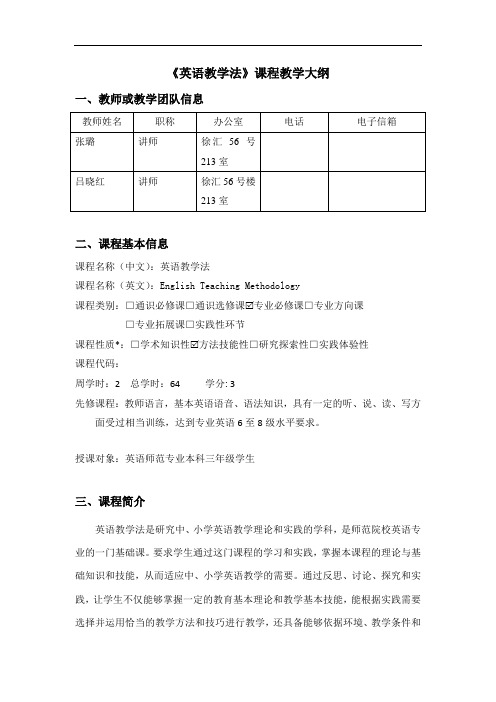
《英语教学法》课程教学大纲一、教师或教学团队信息二、课程基本信息课程名称(中文):英语教学法课程名称(英文):English Teaching Methodology课程类别:□通识必修课□通识选修课 专业必修课□专业方向课□专业拓展课□实践性环节课程性质*:□学术知识性 方法技能性□研究探索性□实践体验性课程代码:周学时:2 总学时:64 学分: 3先修课程:教师语言,基本英语语音、语法知识,具有一定的听、说、读、写方面受过相当训练,达到专业英语6至8级水平要求。
授课对象:英语师范专业本科三年级学生三、课程简介英语教学法是研究中、小学英语教学理论和实践的学科,是师范院校英语专业的一门基础课。
要求学生通过这门课程的学习和实践,掌握本课程的理论与基础知识和技能,从而适应中、小学英语教学的需要。
通过反思、讨论、探究和实践,让学生不仅能够掌握一定的教育基本理论和教学基本技能,能根据实践需要选择并运用恰当的教学方法和技巧进行教学,还具备能够依据环境、教学条件和学生需求以及语言教学的规律,对教学方法和技巧再创造的能力。
四、课程目标通过本课程学习,学生将了解未来英语教师职业的要求,国内外英语教学法流派发展状况和国内英语教学改革前沿信息,认识交际语言教学法、任务型教学法等主流英语教学法的理论背景、教学原则、教学环节、教学设计等,结合英语新课程标准改革,探究适合实际教学对象与教学目标的教学模式。
学习并实践教授英语语言知识、技能的教学原则、常见教学活动的设计与组织,掌握课堂管理的方法,全面了解与分析英语新课程标准,着重英语新课标的评价方式和教材选择或改编等问题。
五、教学内容与进度安排1. 语言教学历史2. 影响语言教学的主要因素3.不同语言教学方法4. 撰写合格教案5. 学会课堂管理6. 了解语音及听力教学7. 课堂口语教学8. 多种语法教学手段9. 阅读教学的三个步骤10. 课堂语言技能的整合11. 观摩掌握教学评估方法12. 学会分析改编现有教材第一学期具体每周每课的教学内容大致教学进度为:第二学期具体每周每课的教学内容大致教学进度为:五、授课形式1、课堂讲授:占总课时的60%2、课外自学:占总课时的10%并非所有的教材内容都在课堂上讲授,在课堂上教师讲授的东西仅限于有一定难度的,同时又非常重要的内容。
英语教学法教程名词解释题
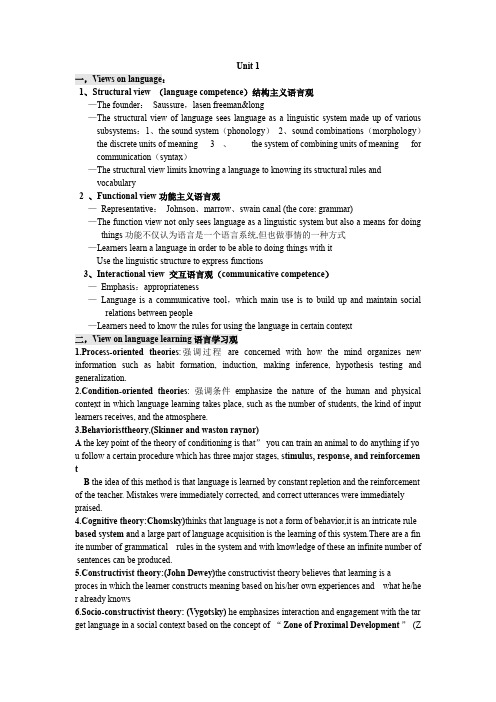
Unit 1一,Views on language:1、Structural view (language competence)结构主义语言观—The founder:Saussure,lasen freeman&long—The structural view of language sees language as a linguistic system made up of various subsystems:1、the sound system(phonology)2、sound combinations(morphology)the discrete units of meaning 3、the system of combining units of meaning for communication(syntax)—The structural view limits knowing a language to knowing its structural rules andvocabulary2 、Functional view功能主义语言观—Representative:Johnson、marrow、swain canal (the core: grammar)—The function view not only sees language as a linguistic system but also a means for doing things功能不仅认为语言是一个语言系统,但也做事情的一种方式—Learners learn a language in order to be able to doing things with itUse the linguistic structure to express functions3、Interactional view 交互语言观(communicative competence)—Emphasis:appropriateness—Language is a communicative tool,which main use is to build up and maintain social relations between people—Learners need to know the rules for using the language in certain context二,View on language learning语言学习观1.Process-oriented theories:强调过程are concerned with how the mind organizes new information such as habit formation, induction, making inference, hypothesis testing and generalization.2.Condition-oriented theories: 强调条件emphasize the nature of the human and physical context in which language learning takes place, such as the number of students, the kind of input learners receives, and the atmosphere.3.Behavioristtheory,(Skinner and waston raynor)A the key point of the theory of conditioning is that”you can train an animal to do anything if yo u follow a certain procedure which has three major stages,s timulus,response,and reinforcemen tB the idea of this method is that language is learned by constant repletion and the reinforcement of the teacher. Mistakes were immediately corrected, and correct utterances were immediately praised.4.Cognitive theory:Chomsky)thinks that language is not a form of behavior,it is an intricate rule-based system a nd a large part of language acquisition is the learning of this system.There are a fin ite number of grammatical rules in the system and with knowledge of these an infinite number of sentences can be produced.5.Constructivist theory:(John Dewey)the constructivist theory believes that learning is a proces in which the learner constructs meaning based on his/her own experiences and what he/he r already knows6.Socio-constructivist theory:(Vygotsky)he emphasizes interaction and engagement with the tar get language in a social context based on the concept of“Zone of Proximal Development”(ZPD)and scaffolding.Unit 2一,What makes a good language teacher?ethic devotion,professional qualities,certain desirable personal styles.四,principles of communicative language teaching(CLT)交际语言教学法原则1)Communication principle:activities that involve real communication promote learning.2)Task principle:activities in which language is used for carrying out meaningful tasks promote learning.3)Meaningfulness principle:language that is meaningful to the learner supports the learning pro cess.五,Howatt proposes a weak and a strong version of CLT.Weak version:learners first acquire language as a structural system and then learn how to use it i n communication. --- the weak version regards overt teaching of language forms and functions as necessary means for helping learners to develop the ability to use them for communication. Strong version:language is acquired through communication.The learners discover the structural system in the process of leaning how to communicate.---regards experiences of using the languag e as the main means or necessary conditions for learning a language as they provide the experienc e for learners to see how language is used in communication.六,PPP: presentation,practice,production三. Principles for good lesson planningA. AimB. VarietyC. FlexibilityD. learning abilityE. linkage四. Components of a lesson plan教案的内容A. Background informationB Teaching aimsC. Language contents and skillsD. stages and proceduresE. Teaching aidsF. End of lesson summaryG.. Optional activities and assignmentsH. After lesson reflectionUnit 5二,The role of the teacher 教师的角色1. Controller: control the pace, the time, the target language, the student.2. Assessor: two thingsa. as corrector: correct the mistakes, organizing feed back the learnersb. as evaluator: to create a success-oriented learning, atmosphere, more praise, less criticism3. Organizer : task based on teaching to design tasks and to organize4. Prompter: to give appropriate prompts hints5. Participant: to take part in the activities6. Resource-provider: as a walking dictionaryUnit 6一,Critical Period Hypothesis关键期假说This hypothesis states that if humans do not learn a foreign language before a certain age ,then due to changes such as maturation of the brain ,it becomes impossible to learn the foreign language like a native speaker.Unit 7三,pennington grammatical pedagogy:1.collocational grammar should biuld on collocational relations between individual lexical items and their subcategories2.Constructive offer learners a way to build elements that can be continually added in sequence3.Contextual it means that elements and structures are taught in relation to their context.四,mechanical practice机械操练1.substitute drills 替换the students substitute a part in a structure so that they get to know howthat part function in a sentence2.Transformation drills转换change a given structure in a way so that they are exposed to another similar structureUnit 81.A: passive/receptive words :words that can be recognized or compared in reading and listeningbut can not be used automatically in speaking and writing.B: active/productive words: words that can be recognized and also be used in speech and writing by learners.Unit 11Sight vocabulary:words that one is able to recognise immediately are often referred to assight vocabulary.Unit15Testing takes the pencil and paper form and it is usually done at the end of a learning period Assessmen t involves the collecting of in formation or evidence of a learner s teaching andlearning.Evaluation:can be concerned with a whole range of issues in and beyond languageeducation :lessons courses programs and skills can all be evaluated ,四,bloom’s taxonomy 目标分类学1.knowledge知识:recalling facts ,terms,and basic conceptsprehension理解:understanding of facts and ideas by organizing ,comparing,translating interpreting,describing and stating the main ideas3.application运用:applying acquired knowledge,facts ,techniques and rules in a different context.4.analysis分析:identifying relationships,causes or motives,and finding evidence to support main ideas.5.synthesis综合:combing elements in a different way and proposing alternative solutions,creative thinking.6.evaluation 评价:present and defend opinions by making informed judgement about informationor ideas based on a set of criteria.、Teaching objectives中心the Ss will be able to understand the main idea of an article about XX and can write a list of XX for XX.词汇be able to name the new word about XX in english using pictures as cues and be able to tell each other whatXX they like.情感be able to talk about their opinions or feelings about XX to each other.其他tell the five simple forms ofXX can role play the dialogue of XXWarming up。
英语教学法复习资料

英语教学法名词解释1.structural view about language:The structural view of language sees language as a linguistic system made up of various subsystems: the sound system (phonology); the discrete units of meaning produced by sound combinations (morphology), and the system of combining units of meaning for communication (syntax). Each language has a finite number of such structural items. To learn a language means to learn these structural items so as to be able to understand and produce language. When this structural view of language was combined with the stimulus-response principles of behaviouristic psychology, the audiolingual approach to language learning emerged.2.functional view about language:In the 1960s, British linguists developed a system of categories based on the communicative needs of the learner and proposed a syllabus based on communicative functions. The functional view no only sees language as a linguistic system but also a means for doing things. Most of our day-to-day language use involves functional activities: offering, suggesting, advising, apologizing, etc. Therefore, learners learn a language in order to be able to do things with it. In order to perform functions, learners need to know how to combine the grammatical rules and the vocabulary to express notions that perform the functions. Examples of notions are the concept of present, past& future time, the expressions of certainty andpossibility, the roles of agents, instruments within a sentence, and special relationships between people and objects.3.Linguistic competence: Linguistic competence ‘is concerned with knowledge of the language itself, its form and meaning'. More specifically, it involves spelling, pronunciation, vocabulary, word formation, grammatical structure, sentence structure, and semantics. Hedge emphasises that linguistic competence is an integral part of communicative competence and it is wrong to think that communicative language teaching does not aim for high standard of linguistic correctness.4.Pragmatic competence: Pragmatic competence is concerned with the appropriate use of the language in social context. That is to say, the choice of the vocabulary and structure depends on the setting, the relative status of the speakers, and their relationships. The above tasks have illustrated this point. In Hymes's words, to know ‘when to speak, when not, what to talk about with whom, when, where and in what manner"5. Discourse competence: Discourse competence refers to one's ability to create coherent written text or conversation and the ability to understand them. In other words, it is one’s ability to express or to understand a topic logically and coherently by effectively employing or comprehending the cohesive markers used in the discourse such as: ‘bythe same token’, ‘to put it in other words’, ‘first’, ‘second’, ‘at last’ , and also the reference words such as ‘it’, ‘they’, ‘that’, etc. in the context. It is these cohesive words which hold meaning together in a sensible way. Discourse competence, according to Hedge, also includes one’s ability to initiate, develop, enter, interrupt, check, or confirm in a conversation.6. Strategic competence: Strategic competence is similar to communication strategies. It refers to strategies one employs when there is communication breakdown due to lack of resources. One can compensate for this by searching for other means of expression, such as using a similar phrase, using gestures, or using a longer explanation. For example, if you forget how to say ‘knife’, you can use gestures to show what you mean or to explain it by saying that it is a tool one can use to cut things. In this way, they can keep the conversation going and possibly get input from the other end.7.Fluency: The last component is termed as fluency, which means one’s ability to ‘link units of speech together with facility and without strain or inappropriate slowness or undue hesitation'. Recent research suggests that teaching learners lexical phrases or chunks of language, also termed as ‘prefabricated language’, ‘can help learners produce the language more fluently’because they can be easily retrieved from memory. Lewis also states that 'fluency is achieved largely by combiningchunks, reducing processing difficulty'. Some examples of these chunks are: ‘in my opinion’, ‘in the same token’, ‘to make a long story short’, ‘to be on the safe side’, ‘I agree with this but…’, ‘take things for granted’, ‘generally speaking’, etc.8. PPP teaching model:Presentation, Practice and Production. A typical PPP lesson would start by the teacher introducing a new language item in a context followed by some controlled practice, such as drilling, repetition, dialogue reading, etc. Students then move on to produce the language in a more meaningful way, such as a role play, a drama, an interview, etc.9. Questions Types: Questions have been classified using different criteria, mainly based on the level of thinking involved in answering the questions. For example, one type of classification makes a distinction between closed and open questions. Closed questions refer to those with only one single correct answer while open questions may invite many different answers. Another classification makes a distinction between display questions and genuine questions. Display questions are those that the answers are already known to the teacher and they are used for checking if students know the answers, too. Conversely, genuine questions are questions which are used to find out new information and since they often reflect real contexts, they are therefore more communicative. A third classification makes a distinction betweenlower-order and higher-order questions. Lower-order questions refer to those that simply require recalling of information or memorisation of facts while higher order questions require more reasoning, analysis, and evaluation. The fourth classification is a taxonomy proposed by Bloom, which underpins the different question types.10. Bloom’s taxonomy:1. Knowledge: recalling facts, terms, and basic concepts2. Comprehension: understanding of facts and ideas by organising, comparing, translating, interpreting, describing, and stating the main ideas3. Application: applying acquired knowledge, facts, techniques and rules in a different context4. Analysis: identifying relationships, causes or motives, and finding evidence to support main ideas,5. Synthesis: combining elements in a different way and proposing alternative solutions, creative thinking6. Evaluation: present and defend opinions by making an informed judgement about information or ideas based on a set of criteria11. Methods of correcting errors: There are different ways and techniques for correcting errors, such as direct teacher correction, indirect teacher correction, self-correction, peer correction, whole class correction, etc. As a general rule, indirect teacher correction isencouraged rather than direct teacher correction to avoid damaging students’self-esteem and confidence. Indirect techniques include 'repeating the problem sentence with an emphasis on the problem in a rising tone' , 'asking a question to invite the student to say it again with a hint of a problem', 'a simple repetition of a correct sentence as a model', and using facial expression or gesture to indicate a problem', etc. In practice, self- correction is encouraged before teacher correction or peer correction because if it is a mistake, the student himself/herself will be able to correct it. If the student cannot self-correct, it means there is a lack of competence and the teacher can help with the correction or may ask other students to help correct it. Sometimes, the whole class can be invited to correct as well. For example, you can select the main error types. Write four or five on the blackboard. Put students in pairs for a few minutes to discuss and correct the errors. Then the whole class can do the correction together. The focus can be choice of vocabulary, use of grammar, or pronunciation. With higher level learners you can also focus on appropriate context, e.g. 'Was the expression polite enough?' ·Was it too formal?"12. Teacher as assessor: It is generally believed it is a major part of a teacher's job to assess the students' work. According to Harmer, as an assessor, the teacher does two things, that is, correcting mistakes and organising feedback. Harmer insists that correcting should be gentle.Gentle correcting involves showing that incorrectness has occurred, but not making a big fuss about it (Harmer, 1983:201). Organising feedback is an effective way to assess students ' performance so that they see the extent of their success or failure. When organising feedback, it is very discouraging for the teacher to be critical. Rather, we believe teachers should focus on students’ success or progress so that a success- oriented learning atmosphere can be created.13. Pair work: Pair work refers to the time when students work in pairs on an exercise or a task. It could be a dialogue reading, a game or an information-gap task between the two students. When students are involved in pair work, the teacher usually circulates around the classroom, answering questions or providing help when necessary. 14. Mistake: A mistake refers to a performance error that is either a random guess or ‘a slip of tongue’, and it is a failure performance to a known system. Everyone makes mistakes, no matter in a native language or in a foreign language. As we can see that a mistake has nothing to do with the language competence, but a result from a temporary breakdown. When a mistake is challenged or given enough attention, it can be self-corrected.15. Error: An error, on the other hand, has direct relation with the learners’ language competence. Errors do not result from carelessness nor hesitation, but lack of knowledge in the target language. Languageerrors cannot be self-corrected no matter how much attention is given.16.Indirect teacher correction:As a general rule, indirect teacher correction is encouraged rather than direct teacher correction to avoid damaging students’self-esteem and confidence. Indirect techniques include 'repeating the problem sentence with an emphasis on the problem in a rising tone' , 'asking a question to invite the student to say it again with a hint of a problem', 'a simple repetition of a correct sentence as a model', and using facial expression or gesture to indicate a problem', etc.17.Minimal pairs:Minimal pairs are pairs of words which have only one sound different from each other.18. The deductive method:The deductive method relies on reasoning, analysing and comparing. First, the teacher writes an example on the board or draws attention to an example in the textbook. Then the teacher explains the underlying rules regarding the forms and positions of certain structural words. The explanations are often done in the student’s native language and use grammatical terms. Sometimes, comparisons are made between the native language and the target language or between the newly presented structure and previously learned structures. Finally, the students practise applying the rule to produce sentences with given prompts.The deductive method is often criticised because a: it teaches grammarin an isolated way; b: little attention is paid to meaning; c: practice is often mechanical. However, this method is not without merits. First, it could be very successful with selected and motivated students. Second, it could save time when students are confronted with a grammar rule which is complex but which has to be learned. Third, it may help increase students' confidence in those examinations which are written with accuracy as the main criterion of success.19.The inductive method: In the inductive method, the teacher provides learners with authentic language data and induces the learners to realise grammar rules without any form of explicit explanation. It is believed that the rules will become evident if the students are given enough appropriate examples. For example, in order to present the two forms ‘this is’ and ‘these are’, the teacher will first hold up a book, saying ‘This is a book.’He/She will do the same showing other objects. Then the teacher holds up several books and says ‘These are books.’ After several similar examples, it is hoped students will understand that ‘these are’ is used with plural forms of nouns. Then students are invited to apply the newly presented structure to produce sentences with given visual aids or verbal prompts. The teacher tries to say nothing except to correct when necessary. Finally, but optionally, the teacher may elicit the grammar rule from the students.20.The guided discovery method: The guided discovery method issimilar to the inductive method in that the students are induced to discover rules by themselves but different in that the process of the discovery is carefully guided and assisted by the teacher and the rules are then elicited and taught explicitly. There are two key theoretical issues related to this method: the role of explicit knowledge in language learning and the value of discovery as a general method of learning. 21. Mechanical practice: Mechanical practice involves activities that are aimed at form accuracy. By doing mechanical practice, the students pay repeated attention to a key element in a structure. Substitution and transformation drills are most frequently used in mechanical practice. 22. Meaningful practice: In meaningful practice the focus is on the production, comprehension or exchange of meaning though the students ‘keep an eye on’ the way newly learned structures are used in the process. Meaningful practice usually comes after mechanical practice. For example, after the presentation and mechanical practice of adjective comparatives and superlatives, the following activity can be done as meaningful practice.23. Denotative meaning: Denotative meaning of a word or a lexical item refers to those words that we use to label things as regards real objects, such as a name or a sign, etc. in the physical world. This is usually the primary meaning of a word and may seem relatively easy to learn. However, problems exist as we may not always be able to findequivalent concepts from one language to another. For example, the word ‘niece’ and ‘nephew’ in English refer to one’s brothers’ or sisters’daughters and sons, while in Chinese there is a distinction made between the names used to describe one's brother's children and of one’s sister 's. It is quite easy to find examples like this in many other areas. Often in such cases, new concepts will have to be added to one's vocabulary.24. Connotative meaning: A connotative meaning of a word refers to ‘the attitudes or emotions of a language user in choosing a word and the influence of these on the listener or reader’s interpretation of the word’. These would include words that may express a positive or negative attitude or subtle feelings towards something. According to Hedge, ‘connotative meaning derives from a mix of cultural, political, social, and historical sources and learners will be aware of this phenomenon in their own language’ but may not be so aware of it in the target language. A case in point would be an example given by Ur, who points out that the word ‘dog’ with its denotative meaning referring to the animal itself has a connotative meaning often related to friendship and loyalty. But in different cultures the same word may have different connotative meanings.The second aspect of meaning regarding vocabulary learning involves the understanding of sense relations among words. Lexical items of thiskind include word collocations, synonyms, antonyms, and hyponyms. 25. Collocation: Collocations refer to words that co-occur with high frequency and have been accepted as ways for the use of words. For instance, in English, the words ‘see’, ‘watch’, and ‘look’are similar in meaning but are often used with different collocations as we will say ‘see a movie’, ‘watch a play’ and ‘look at a picture’ . Similarly, we say ‘heavy traffic’, ‘heavy smoker’, ‘heavy rain/snow/fog’ but never ‘heavy accident’ or ‘heavy wind’. It is believed that teaching word collocations is a more effective way than just teaching one single word at a time as Nation notes that ‘all fluent and appropriate language use requires collocational knowledge.’26.Receptive and productive vocabulary: Receptive/passive vocabulary refers to words that one is able to recognise and comprehend in reading or listening but unable to use automatically in speaking or writing. Those words that one is not only able to recognise but also able to use in speech and writing are considered as one’s productive/active vocabulary. At beginner level, most new words learned by students usually have immediate practical use, hence they quickly become one’s productive vocabulary. However, as students learn more and more words, they will find that for some words they are able to use for speaking and writing but for some other words they can only be recognised when encountered in reading. Also, for many word, after being encounteredmore and more times they gradually enters from one's receptive to one’s productive vocabulary.Nation gives a more detailed explanation about what we mean by receptive and productive vocabulary. From his point of view, receptive knowledge involves (1) being able to recognise the word when it is heard;(2) being familiar with its written form so that it is recognised when it is met in reading; (3) recognising that it is made up of some parts and being able to relate these parts to its meaning; (4) knowing that the word signals a particular meaning; (5) knowing what the word means in the particular context in which it has just occurred; (6) knowing the concept behind the word which will allow understanding in a variety of contexts; (7) knowing that there are some related words; (8) being able to recognise that the word has been used correctly in the sentence in which it occurs; (9) being able to recognise the typical collocations;(10)knowing that the word is not an uncommon one and is not a pejorative word. Productive knowledge of a word incudes receptive know ledge and extends it. It involves: (l)being able to say it with correct pronunciation including stress; (2)being able write it with correct spelling;(3) being able to construct it using the right word parts in their appropriate forms; (4) being able to produce the word to express the meaning; (5)being able to produce the word in different contexts to express the range of meanings of it;(6) being able to produce synonymsand opposites for it; (7) being able to use the word correctly in an original sentence; (8) being able to produce words that commonly occur with it; (9) being able to decide to use or not use the word to suit the degree of formality of the situation.27.Taxonomy proposed by Bloom●Knowledge: recalling facts, terms, and basic concepts●Comprehension: understanding of facts and ideas by organizing,comparing, translating, interpreting, describing, and stating the main ideas●Application: applying acquired knowledge, facts, techniques, andrules in a different context●Analysis: identifying relationships, causes or motives, and findingevidence to support main ideas●Synthesis: combining elements in a different way and proposingalternative solutions, creative thinking●Evaluation: present and defend opinions by making an informedjudgement about information or ideas based on a set of criteria. 28.(language)Errors and mistakesAn error is something you say or write considered to be incorrect or wrong. It is a failure due to the lack of the target language knowledge.A mistake is incorrect performance in speech or writing to a known language system.29. Questions●Closed and open questionsClosed questions refer to those with only one single correct answer. Open questions refer to those that may invite different answers.●Display questions and genuine questionsDisplay questions are those that the answers are already known to the teacher and they are used for checking if students know the answer, too. Genuine questions are questions which are used to find out new information and since they often reflect real context, they are therefore more communicative.●Lower-order and higher-order questionsLower-order questions are questions that simply require recalling of information or memorization of facts.Higher-order questions are those that require more reasoning, analysis, and evaluation.●Taxonomy proposed by Bloom做过的题一、Decide whether the following statement is true or false.1. It is a communicative activity if students are doing work focusing on the accuracy of language.(F)2. It is a communicative activity if students are making a conversation to practice a certain grammatical structure. (F)3. It is a communicative activity when students are asked to work in pair to find the differences of the pictures they hold in their hand.(T)4. It is a communicative activity when students are playing different roles through cued dialogues.(T)5. It is a communicative activity when students are asked to write a letter to their headmaster following a sample letter using certain grammatical structures .(F)6. It is a communicative activity if students are asked to recite a dialogue in the text by heart .(F)7. It is a communicative activity when students are talking to each other regardless of language restrictions.(T)8. It is a communicative activity if the teacher askes a students a question to which the student has already known the answer.(F)9. It is a communicative activity if the teacher corrects the students' grammar mistakes when they are answering a question.(F)10. It is a communicative activity when students are working in pairs exchanging information to each other.(T)二、Fill in each of the blanks with a proper word or phrase in the following table. Each word or phrase can be used only once.1. At the beginning of class, the teacher presents and explains a grammatical structure to the students so that they can practice the structure following the model the teachers gave. This activity reveals an approach of PPP .2. If a learner knows the knowledge of the target language and is able to use the language correctly in pronunciation, vocabulary and grammar, we may say that the learner has linguistic competence .3. When students are reading a text and trying to find out the logic relations between paragraphs, they are practicing their thinking quality.4. If students are asked to find out the life styles of the people in an English speaking country, they are focusing on practicing their ability of cultural awareness.5. A typical TBLT cycle leads students from fluency to accuracy. It is a process of using the target language to learn the language.6. If students are asked to practice using a word correctly in forms, we may say that this activity aims for the students to achieve the accuracy of the language.7. When students are asked to look at a diagram or cartoon in the text to figure out their implicit meaning, they are practicing the skill of viewing.8. When students are working in groups in class to discuss organizing a spring outing, they are lead to use the target language from fluency to accuracy.9. When the teacher guides students to make a study plan for themselves, he/she is willing to help them to achieve learning ability. 10. When students are participating asking and giving directions to a stranger in the target language, the activity they are doing reveals the functional view of language.三、Decide whether the following statements are true or false.1. Proper lesson planning is essential for only novice teachers, senior or experienced teachers do not need to do lesson planning.(F)2. A lesson plan is a framework of a lesson in which teachers make advance decisions about what they hope to achieve and how they would like to achieve it.(T)3. A lesson plan is something that a teacher must strictly stick to during the lesson.(F)4. A good lesson plan is the backbone of the lesson and it can give teachers, especially novice teachers, confidence in class.(T)5. A lesson plan is a piece of work written by the teacher to entertain the headmaster of the school.(F)6. If a teacher uses the same textbook and same materials for the new students as the old ones, he/she does not need to rewrite or revise his/her lesson plan.(F)7. A lesson plan should be long enough to contain everything the teacher prepares to say and to do in class. (F)8. A lesson plan can ensure the success of the lesson if the teacher follows every step in the lesson.(F)四、Fill in the blanks with a proper word in its proper form . Each word can be used only once and three words in the blank shall be odded out. (有三个词或词组不能用在空格里。
《英语教学法教程》(王蔷)考研复习资料-名词解释
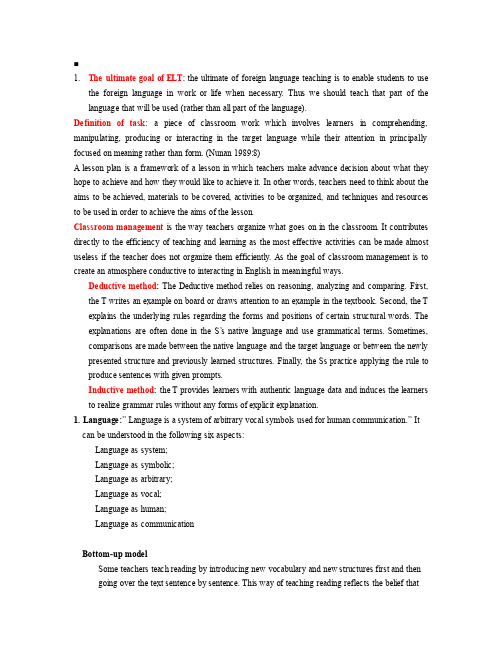
1.The ultimate goal of ELT: the ultimate of foreign language teaching is to enable students to usethe foreign language in work or life when necessary. Thus we should teach that part of the language that will be used (rather than all part of the language).Definition of task: a piece of classroom work which involves learners in comprehending, manipulating, producing or interacting in the target language while their attention in principally focused on meaning rather than form. (Nunan 1989:8)A lesson plan is a framework of a lesson in which teachers make advance decision about what they hope to achieve and how they would like to achieve it. In other words, teachers need to think about the aims to be achieved, materials to be covered, activities to be organized, and techniques and resources to be used in order to achieve the aims of the lesson.Classroom management is the way teachers organize what goes on in the classroom. It contributes directly to the efficiency of teaching and learning as the most effective activities can be made almost useless if the teacher does not organize them efficiently. As the goal of classroom management is to create an atmosphere conductive to interacting in English in meaningful ways.Deductive method: The Deductive method relies on reasoning, analyzing and comparing. First, the T writes an example on board or draws attention to an example in the textbook. Second, the T explains the underlying rules regarding the forms and positions of certain structural words. The explanations ar e often done in the S’s native language and use grammatical terms. Sometimes, comparisons are made between the native language and the target language or between the newly presented structure and previously learned structures. Finally, the Ss practice applying the rule to produce sentences with given prompts.Inductive method: the T provides learners with authentic language data and induces the learners to realize grammar rules without any forms of explicit explanation.1. Language:” Language is a system of arbitrary vocal symbols used for human communication.” It can be understood in the following six aspects:Language as system;Language as symbolic;Language as arbitrary;Language as vocal;Language as human;Language as communicationBottom-up modelSome teachers teach reading by introducing new vocabulary and new structures first and then going over the text sentence by sentence. This way of teaching reading reflects the belief thatreading comprehension is based on the understanding and mastery熟练of all the new words, new phrases, and new structures as well as a lot of reading aloud practice. Also, this reading follows a linear process from the recognition of letters, to words, to phrases, to sentences, to paragraphs, and then to the meaning of the whole text. This way of teaching reading is said to follow a bottom-up model.2). Top-down modelIt is believed that in teaching reading, the teacher should teach the background knowledge first so that students equipped with such knowledge will be able to guess meaning from the printed page. This process of reading is said to follow the top-down model of teaching reading just as Goodman(1970) once said that reading was “a psycholinguistic guessing game”2. Structural view:The structural view sees language as a linguistic system made up of various subsystems: from phonological, morphological, lexical, etc. to sentences.3. The functional view:The functional view sees language as a linguistic system but also as a means for doing things.Most of our day-to-day language use involves functional activities: greetings; offering,suggesting, advising, apologizing, etc.The communicative view of languageThe communicative, or functional view of language is the view that language is a vehicle for the expression of functional meaning. The semantic and communicative dimensions of language are more emphasized than the grammatical characteristics, although these are also included.4. The interactional view:The interactional view considers language as a communicative tool, whose main use is to build up and maintain social relations between people.1) The behaviorist theory( Skinne r)-- a stimulus-response theory of psychologyThe key point of the theory of conditioning is that "you can train an animal to do anything (within reason) if you follow a certain procedure which has three major stages, stimulus,response, and reinforcement"2) Cognitive theory( Noam Chomsky):The term cognitive is to describe loosely methods in which students are asked to think rather than simply repeat.The goal of CLTThe goal of CLT is to develop students' communicative competenceLesson planning means making decisions in advance about what techniques, activities and materials will be used in the class.Teaching stages and procedures:Teaching stages are the major steps that language teachers go through in the classroom.Procedures are the detailed steps in each teaching stage.31. Three P's model: presentation, practice and production.SkimmingSkimming means reading quickly to get the gist,i.e. the main idea of the text.ScanningScanning means to read to locate/get specific information.1). DiscussionA discussion is often used for a) exchange of personal opinions. This sort of discussion canstart with a question like "What do you think of?"b) stating of personal opinions ongeneral issues. c) problem-solving.d) the ranking(分类;顺序)of alternatives e) deciding upon priorities(先;前)etc.2). Role-playRole-play is a very common language learning activity where students play differentroles and interact from the point of view of the roles they play.What’s called A process approach to writing1). DefinitionWhat really matters or makes a difference is the help that the teacher provides toguide the students through the process that they undergo when they are writing. What’s the assessmentAssessment in ELT means to discover what the learners know and can do at a certain stage of the learning process.a. Grammar Translation:The Grammar Translation method started around the time of Erasmus (1466-1536). Its primary focus is on memorization of verb paradigms, grammar rules, and vocabulary. Application of this knowledge was directed on translation of literary texts--focusing of developing students' appreciation of the target language's literature as well as teaching the language. Activities utilized in today's classrooms include: questions that follow a reading passage; translating literary passages from one language to another; memorizing grammar rules; memorizing native-language equivalents of target language vocabulary. (Highly structured class work with the teacher controlling all activities.)b. Direct Method:The Direct Method was introduced by the German educator Wilhelm Viëtor in the early 1800's.Focusing on oral language, it requires that all instruction be conducted in the target language with no recourse to translation. Reading and writing are taught from the beginning, although speaking and listening skills are emphasized--grammar is learned inductively. It has a balanced, four-skill emphasis.c. The Silent Way:The teacher is active in setting up classroom situations while the students do most of the talkingand interaction among themselves. All four skills (listening, speaking, reading & writing) are taught from the beginning. Student errors are expected as a normal part of learning; the teacher's silence helps to foster self-reliance and student initiative.d. Community Language Learning:Teachers recognize that learning can be threatening and by understanding and accepting students' fears, they help their students feel secure and overcome their fears of language learning--ultimately providing students with positive energy directed at language learning. Students choose what they want to learn in the class and the syllabus is learner-generated.e. Natural Approach:Introduced by Gottlieb Henese and Dr. L. Sauveur in Boston around 1866. The Natural Approach is similar to the Direct Method, concentrating on active demonstrations to convey meaning by associating words and phrases with objects and actions. Associations are achieved via mime, paraphrase and the use of manipulatives. Terrell (1977) focused on the principles of meaningful communication, comprehension before production, and indirect error correction. Krashen's (1980) input hypothesis is applied in the Naturale. Reading Method:The reading method was prominent in the U.S. following the Committee of Twelve in 1900 and following the Modern Foreign Language Study in 1928. The earlier method was similar to the traditional Grammar/Translation method and emphasized the transference of linguistic understanding to English. Presently, the reading method focuses more on silent reading for comprehension purposes.f. ASTP and the Audiolingual Method:This approach is based on the behaviorist belief that language learning is the acquisition of a set of correct language habits. The learner repeats patterns and phrases in the language laboratory until able to reproduce them spontaneously.ASTP (Army Specialized Training Program) was an intensive, specialized approach to language instruction used in during the 1940's. In the postwar years, the civilian version of ASTP and the audiolingual method featured memorization of dialogues, pattern drills, and emphasis on pronunciation.g. Cognitive Methods:Cognitive methods of language teaching are based on meaningful acquisition of grammar structures followed by meaningful practice.h. Communicative Methods:The goal of communicative language approaches is to create a realistic context for language acquisition in the classroom. The focus is on functional language usage and the ability to learners to express their own ideas, feelings, attitudes, desires and needs. Open ended questioning and problem-solving activities and exchanges of personal information are utilized as the primary means of communication. Students usually work with authentic materials(authentic realia) in small groups on communication activities, during which they receive practice in negotiating meaning.i. Total Physical Response Method:This approach to second language teaching is based on the belief that listening comprehension should be fully developed before any active oralparticipation from students is expected (just as it is with children when theyare learning their native language) .What is the Grammar-Translation Method?The Grammar-Translation Method is designed around grammatical structures.The Functional-Notional ApproachUnlike the Grammar-Translation Method, which is based on the grammar structures, it thinks thata general learner should take part in the language activities, the functions of language involved inthe real and normal life are most important. For example, the learners have to learn how to give directions, buy goods, ask a price, claim ownership of something and so on. It tells that is not just important to know the forms of the language, it is also important to know the functions and situations, so that the learner could practice real-life communication.Communicative CompetenceBoth knowledge about the language and the knowledge about how to use the language in communicative situation appropriately.Critical Period Hypothesis关键期假说This hypothesis states that if humans do not learn a foreign language before a certain age ,then due to changes such as maturation of the brain ,it becomes impossible to learn the foreign language like a native speaker.1.Process-oriented theories:强调过程are concerned with how the mind organizes newinformation such as habit formation, induction, making inference, hypothesis testing and generalization.2.Condition-oriented theories: 强调条件emphasize the nature of the human and physical context in which language learning takes place, such as the number of students, the kind of input learners receives, and the atmosphere.3.Behavioristtheory,(Skinner and waston raynor)A the key point of the theory of conditioning is that” you can train an animal to do anything if you follow a certain procedure which has three major stages, s timulus, response, and reinforcementB the idea of this method is that language is learned by constant repletion and the reinforcement of the teacher. Mistakes were immediately corrected, and correct utterances were immediately praised.4.Cognitive theory:Chomsky)thinks that language is not a form of behavior,it is an intricate rule-based system a nd a large part of language acquisition is the learning of this system.There are a fin ite number of grammatical rules in the system and with knowledge of these an infinite number of s entences can be produced.5.Constructivist theory:(John Dewey)the constructivist theory believes that learning is aproces i n which the learner constructs meaning based on his/her own experiences and what he/her already knows6.Socio-constructivist theory: (Vygotsky) he emphasizes interaction and engagement with the tar get language in a social context based on the concept of “Zone of Proximal Development” (ZPD) and scaffolding.。
(完整word版)《英语教学法》名词解释

《英语教学法》名词解释<P3>◆Structural view (结构主义语言理论)The structural view of language sees language as a linguistic system made up of various subsystems: the sound system (phonology); the discrete units of meaning produced by sound combinations (morphology), and the system of combining units of meaning for communication (syntax).◆Functional view(功能主义语言理论)The functional view not only sees language as a linguistic system but also a means for doing things. In order to perform functions, learners need to know how to combine the grammatical rules and the vocabulary to express notions that perform the functions.◆Interactional view(交互语言理论)The interactional view considers language to be a communicative tool, whose main use is to build up and maintain social relations between people.<P5-6>◆Behaviourist theory(行为主义理论)------SkinnerThe key point of the theory of conditioning is that"you can train an animal to do anything( with reason) if you follow a certain procedure whichhas three major stages, stimulus, response, and reinforcement".◆Cognitive theory(认知理论)Chomsky thinks that language is not a form of behaviour, it is an intricate rule-based system and a large part of language acquisition is the learning of this system. There are a finite number of grammatical rules in the system and with a knowledge of these an infinite number of sentences can be produced. A language learner acquires language competence which enables him to produce language.◆Constructivist theory (建构主义理论)-------John DeweyThe constructivist theory believes that learning is a process in which the learner constructs meaning based on his/her own experiences and what he/she already knows.◆Socio-constructivist theory (社会建构主义理论)Vygotsky emphasises interaction and engagement with the target language in a social context based on the concept of “Zone of Proximal Development” (ZPD) and scaffolding.<P18>◆Linguistic competence(语言能力)----HedgeLinguistic competence is concerned with knowledge of the language itself, its form and meaning.◆Pragmatic competence (语用能力) ----HedgePragmatic competence is concerned with the appropriate use of the language in social context.◆Discourse competence (话语能力/ 语篇能力) ----Canale and SwainDiscourse competence refers to one’s ability to create coherent written text or conversation and the ability to understand them.◆Strategic competence (策略能力)Strategic competence refers to strategies one employs when there is communication breakdown due to lack of resources.<P86>◆ErrorsAn error has direct relation with the learners’language competence.Errors result from lack of knowledge in the target language.◆MistakesA mistake refers to a performance error that is either a random guess or a slip of tongue, and it is a failure performance to a known system.Mistakes result from carelessness and hesitation.<P143>◆Bottom-up model (自下而上的模式)In the bottom-up model, listening comprehension is believed to start with sound and meaning recognitions. In other words, “we use information in the speech itself to try to comprehend the meaning” .Top-down model (自上而下的模式)In the top-down model, listening for gist and making use of the contextual clues and background knowledge to construct meaning are emphasised. In other words, listening comprehension involves “ knowledge that a listener brings to a text, sometimes called “ inside the head” information, as opposed to the information that is available within the text itself” .。
- 1、下载文档前请自行甄别文档内容的完整性,平台不提供额外的编辑、内容补充、找答案等附加服务。
- 2、"仅部分预览"的文档,不可在线预览部分如存在完整性等问题,可反馈申请退款(可完整预览的文档不适用该条件!)。
- 3、如文档侵犯您的权益,请联系客服反馈,我们会尽快为您处理(人工客服工作时间:9:00-18:30)。
《英语教学法》名词解释
<P3>
◆Structural view (结构主义语言理论)
The structural view of language sees language as a linguistic system made up of various subsystems: the sound system (phonology); the discrete units of meaning produced by sound combinations (morphology), and the system of combining units of meaning for communication (syntax).
◆Functional view(功能主义语言理论)
The functional view not only sees language as a linguistic system but also a means for doing things. In order to perform functions, learners need to know how to combine the grammatical rules and the vocabulary to express notions that perform the functions.
◆Interactional view(交互语言理论)
The interactional view considers language to be a communicative tool, whose main use is to build up and maintain social relations between people.
<P5-6>
◆Behaviourist theory(行为主义理论)------Skinner
The key point of the theory of conditioning is that"you can train an animal to do anything( with reason) if you follow a certain procedure which has three major stages, stimulus, response, and reinforcement".
◆Cognitive theory(认知理论)
Chomsky thinks that language is not a form of behaviour, it is an intricate rule-based system and a large part of language acquisition is the learning of this system. There are a finite number of grammatical rules in the system and with a knowledge of these an infinite number of sentences can be produced. A language learner acquires language competence which enables him to produce language.
◆Constructivist theory (建构主义理论)-------John Dewey
The constructivist theory believes that learning is a process in which the learner constructs meaning based on his/her own experiences and what he/she already knows.
◆Socio-constructivist theory (社会建构主义理论)
Vygotsky emphasises interaction and engagement with the target language in a social context based on the concept of “Zone of Proximal Development” (ZPD) and scaffolding.
<P18>
◆Linguistic competence(语言能力)----Hedge
Linguistic competence is concerned with knowledge of the language itself, its form and meaning.
◆Pragmatic competence (语用能力) ----Hedge
Pragmatic competence is concerned with the appropriate use of the language in social context.
◆Discourse competence (话语能力/ 语篇能力) ----Canale and Swain
Discourse competence refers to one’s ability to create coherent written text or conversation and the ability to understand them.
◆Strategic competence (策略能力)
Strategic competence refers to strategies one employs when there is communication breakdown due to lack of resources.
<P86>
◆Errors
An error has direct relation with the learners’language competence.Errors result from lack of knowledge in the target language.
◆Mistakes
A mistake refers to a performance error that is either a random
guess or a slip of tongue, and it is a failure performance to a known system.Mistakes result from carelessness and hesitation.
<P143>
◆Bottom-up model (自下而上的模式)
In the bottom-up model, listening comprehension is believed to start with sound and meaning recognitions. In other words, “we use information in the speech itself to try to comprehend the meaning” .
◆Top-down model (自上而下的模式)
In the top-down model, listening for gist and making use of the contextual clues and background knowledge to construct meaning are emphasised. In other words, listening comprehension involves “ knowledge that a listener brings to a text, sometimes called “ inside the head” information, as opposed to the information that is available within the text itself” .。
